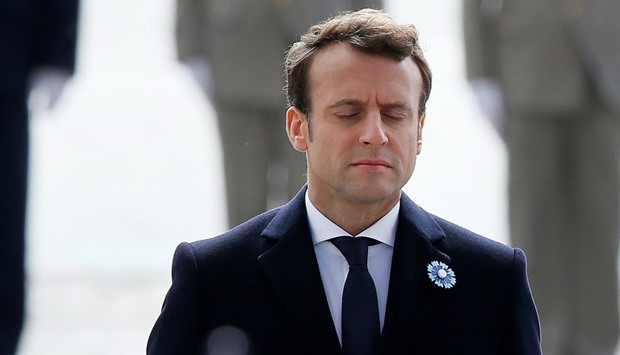After cheering Emmanuel Macron’s win over his far-right rival in the French presidential election, a row has broken out within German Chancellor Angela Merkel’s coalition government over how to respond to his calls for closer European integration.
Foreign Minister Sigmar Gabriel of the centre-left Social Democrats (SPD) accused his cabinet colleague, Finance Minister Wolfgang Schaeuble, of trying to “torpedo” Macron’s European reform plans for political reasons ahead of Germany’s national election in September.
He was reacting to comments from Schaeuble suggesting that Macron’s idea to create a budget and a finance minister for the euro zone were unrealistic because they would require politically thorny changes to the EU treaty.
The jousting comes a week before Macron is expected to travel to Berlin to meet Merkel.
He will be sworn in on Sunday, after soundly defeating National Front leader Marine Le Pen, who had threatened to take France out of the EU and the euro.
The 39-year-old Macron has promised to reinvigorate the Franco-German relationship and press ahead with closer integration after a decade of economic and political crises and Britain’s decision last year to leave the EU.
His ideas have been embraced by the SPD.
But Conservatives around Merkel, fearful the euro zone could develop into a “transfer union” in which Germany is asked to pay for struggling states that resist reforms, are pushing back.
Gabriel, who worked closely with Macron on ideas for European reforms when both were economy ministers, accused Schaeuble in the Tagesspiegel newspaper of fanning fears about the Frenchman’s plans for “tactical electoral purposes”.
His party colleague Martin Schulz, who will challenge Merkel in the German election, backed Macron’s idea to create a budget for the euro zone to fund investments.
Schaeuble reiterated in a speech to students in the eastern city of Frankfurt-Oder that such a step was impossible without treaty change, a cumbersome multi-year process requiring referendums in some member states.
Instead he has proposed turning the euro zone’s ESM bailout fund into a European monetary fund.
People in Macron’s team and some senior EU officials reject Schaeuble’s contention that treaty change would be needed, pointing to the intergovernmental agreement between 19 euro members that established the ESM.
Macron has said his priority this year will be to implement economic reforms at home and his aides say he has no plans to begin a potentially contentious discussion with Berlin on euro zone reform before a new German government is in place.
“I expect him to be quite open with Merkel about what he wants to do but also mindful that the election puts the chancellor in a difficult position.
He won’t be putting big bazookas on the table,” one person close to Macron told Reuters.
Instead, the person said, Macron could discuss with Merkel the idea of setting up Franco-German working groups in the coming months in areas where there is appetite for cooperation, including security and defence, energy and taxation.
Macron’s eagerness to seek a dialogue with Berlin on Europe hasn’t stopped German politicians from criticising his ideas.
Christian Lindner, the leader of the liberal Free Democrats (FDP), a potential coalition partner for Merkel if she beats Schulz in September, told the Frankfurter Allgemeine Zeitung (FAZ) yesterday that he expected an “uncomfortable” discussion with Macron on Europe.
“He is for an EU in which responsibilities are standardised and blurred,” Lindner said, accusing the SPD of conspiring with Macron to promote higher government debt.
The criticism has also flowed in the other direction.
Top Macron adviser Jean-Pisani Ferry said last week that Germany’s “obsession” with the idea that other European countries want its money had clouded its view on the need for closer euro zone integration.
Germany’s defence minister announced reforms yesterday to rid the armed forces of links with the Nazi-era Wehrmacht, responding to a scandal around a far-right attack plot within the military.
Two soldiers and one civilian have been arrested over an alleged conspiracy to kill pro-refugee politicians and — having created the fake identity of a Syrian refugee — make it look like an Islamist attack.
Defence Minister Ursula von der Leyen announced a series of reforms for the Nato member’s armed forces, including a review of its 1982 “decree on traditions” which allows the display of Wehrmacht memorabilia within its “historical context”.
The current rules “include many good points but allow for back doors”, she said, following revelations that Nazi-era army steel helmets, weapons and pictures were on open display in some army barracks.
Amid the scandal, debate has flared on why a Wehrmacht item can be shown in a glass display but not in an officers’ mess, and why several barracks are still named after World War II field marshall Erwin Rommel, dubbed the “Desert Fox” for his North Africa campaign.
Von der Leyen had pledged zero tolerance on all forms of extremism after it emerged the top suspect arrested, Lieutenant Franco Albrecht, 28, had expressed racist views years ago but that superior officers looked the other way out of a “misunderstood esprit de corps”.
The minister, under fire over the scandal, also announced changes to reporting chains.

Emmanuel Macron
